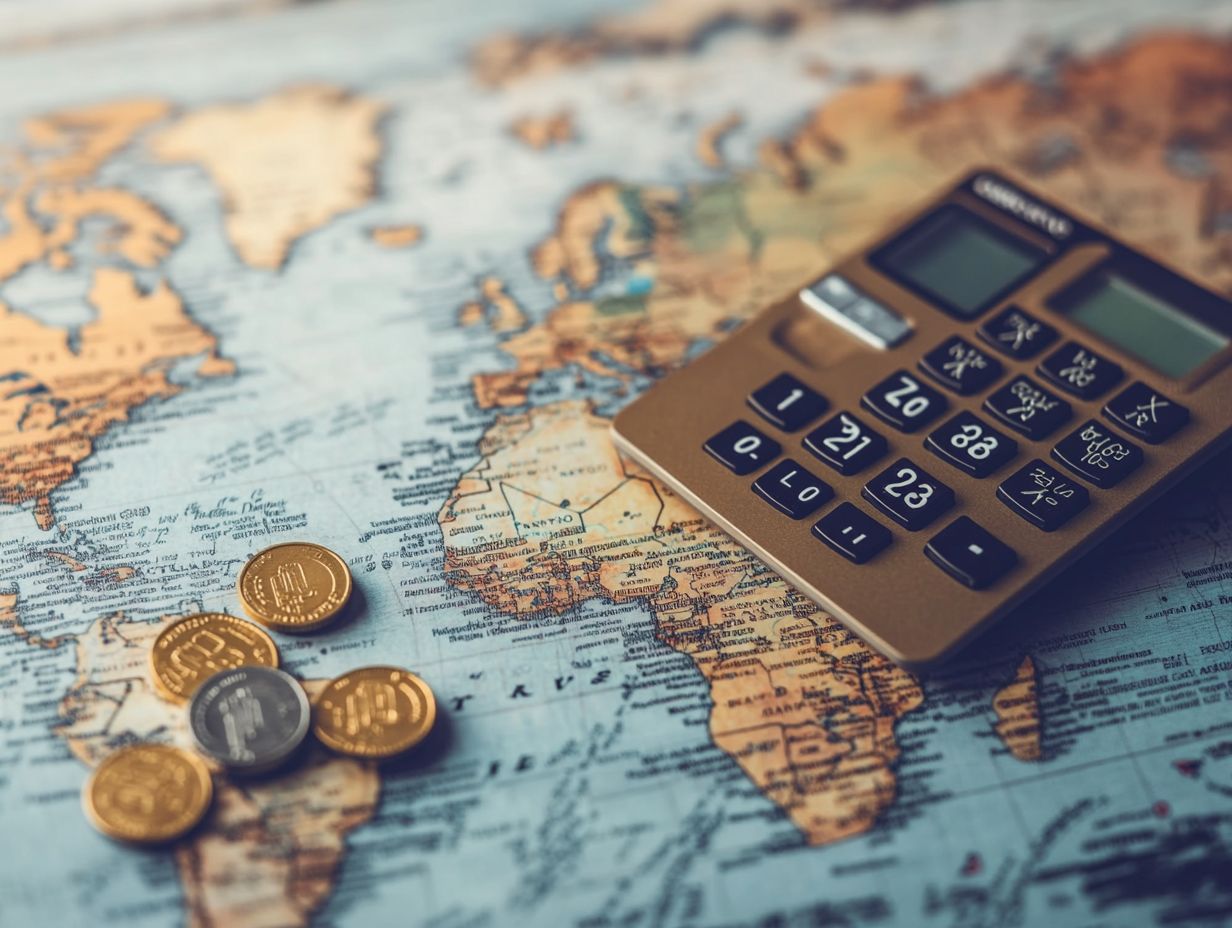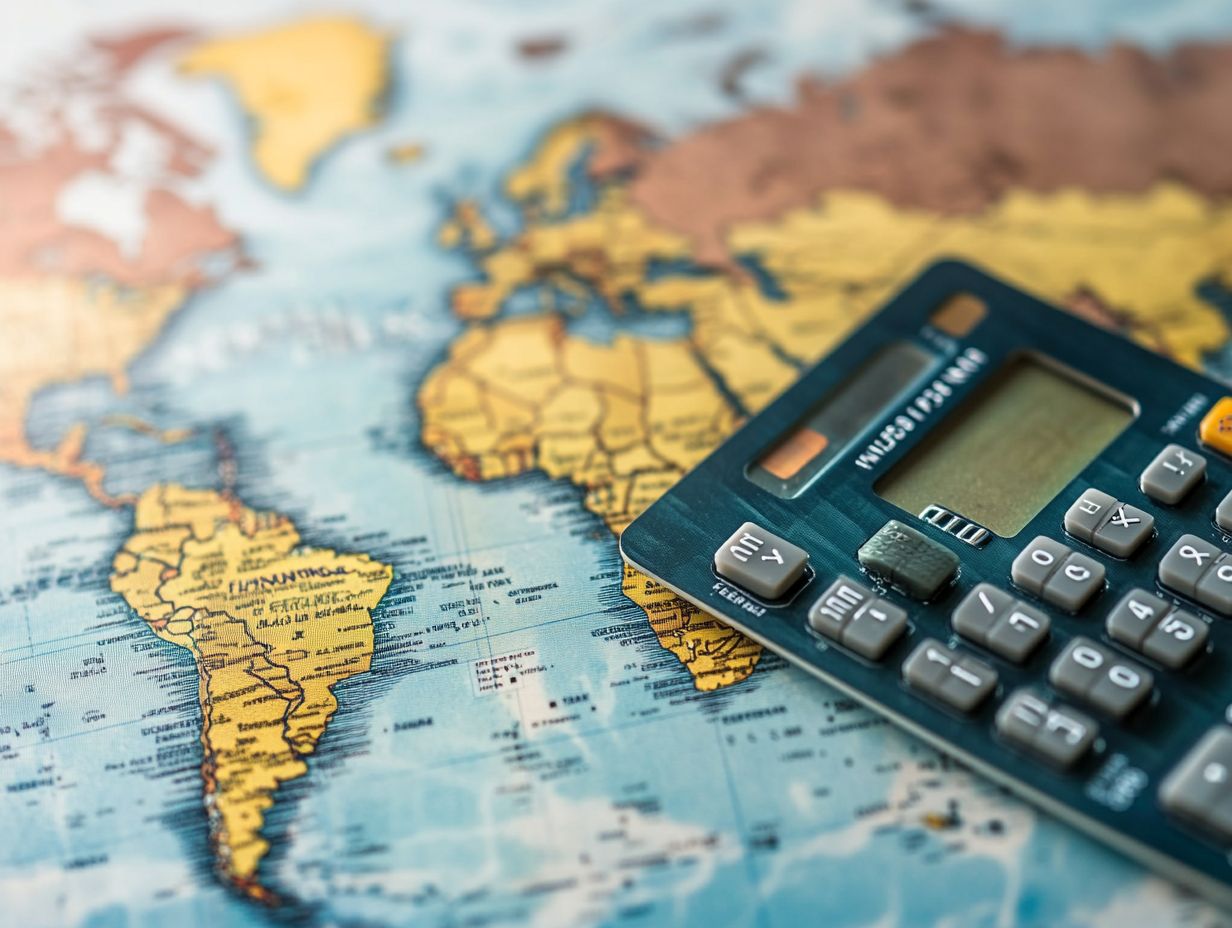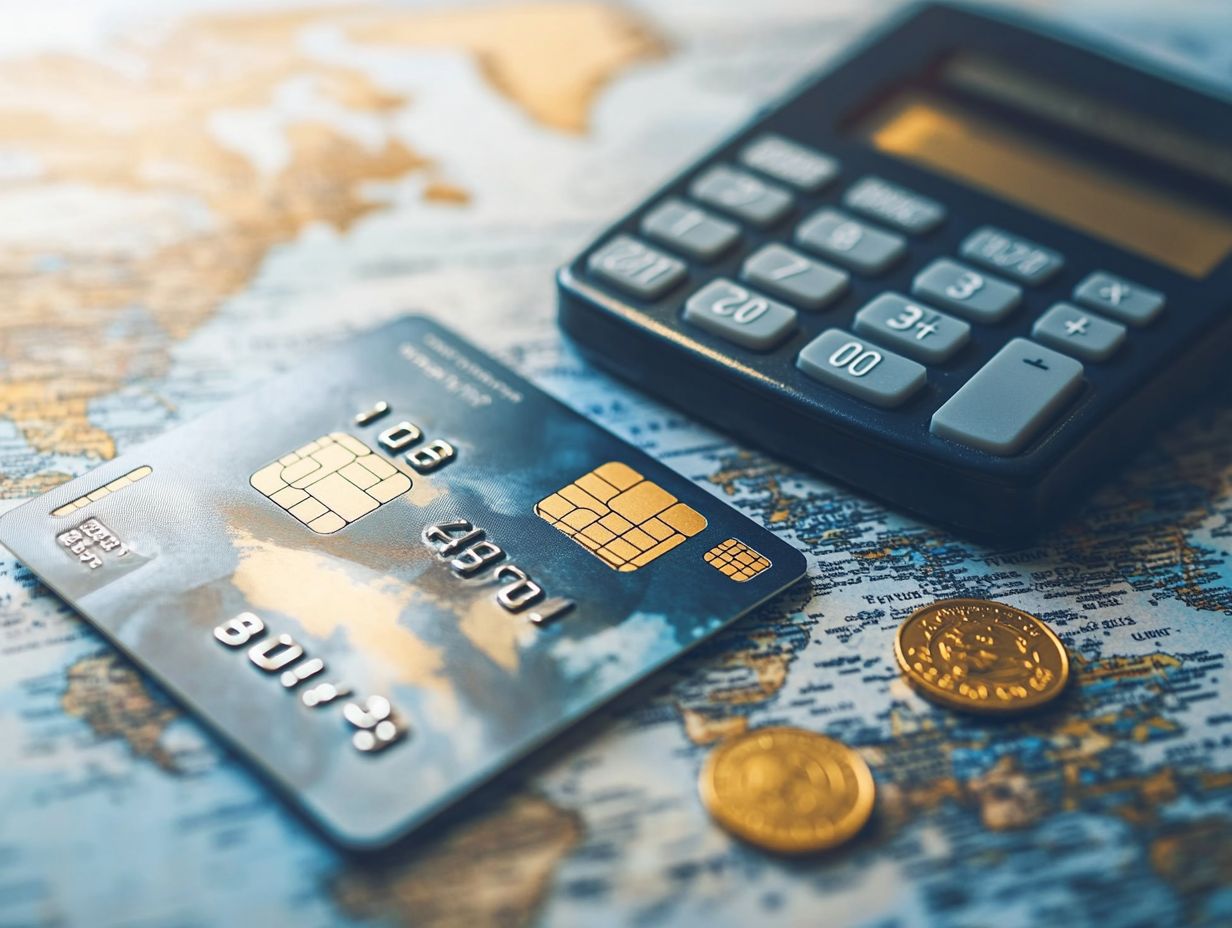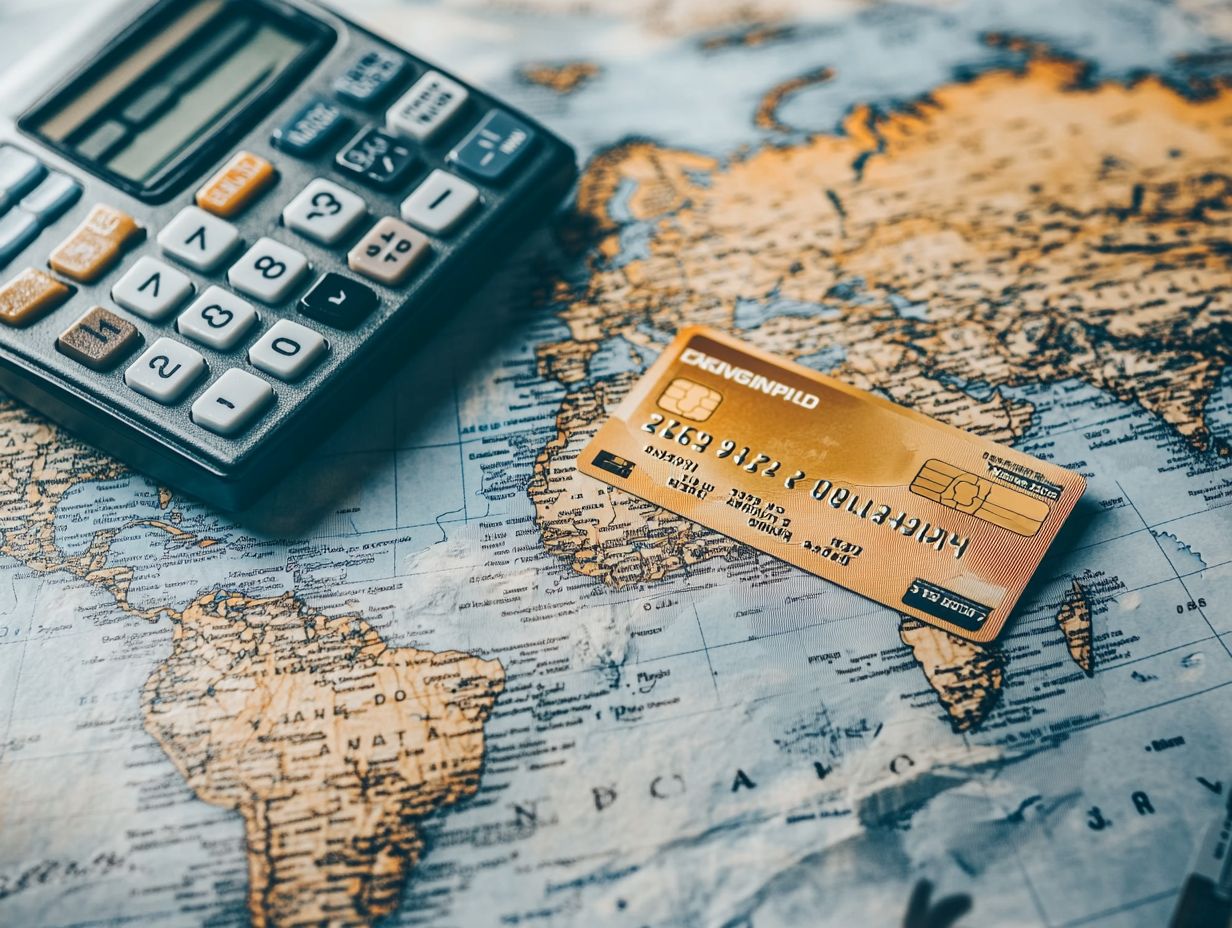Understanding Foreign Transaction Fees
When you travel or make purchases abroad, you might find yourself facing foreign transaction fees, often leaving you wondering what these charges are all about and why they even exist.
Let s dive into foreign transaction fees what they are, why they matter, and how you can save money when spending abroad! This article defines what foreign transaction fees are, the common types you might encounter, and why banks choose to impose them. It explains how these fees operate, provides practical tips to help you minimize costs, and highlights alternative options to traditional banking for your international transactions.
Continue reading to equip yourself with the knowledge of a savvy traveler and smart spender!
Contents
- Key Takeaways:
- What are Foreign Transaction Fees?
- Why Banks Charge Foreign Transaction Fees
- How Foreign Transaction Fees Work
- Ways to Avoid or Minimize Foreign Transaction Fees
- Alternatives to Traditional Banks for International Transactions
- Frequently Asked Questions
- What are foreign transaction fees?
- Why do credit card companies charge foreign transaction fees?
- How much are foreign transaction fees typically?
- Do all credit cards charge foreign transaction fees?
- Are there any ways to avoid foreign transaction fees?
- Are foreign transaction fees the same as currency conversion fees?
Key Takeaways:

- Foreign transaction fees are charges applied by banks for using your credit or debit card in a foreign country.
- Banks justify foreign transaction fees as a means to cover the cost of currency conversion and international network fees.
- Foreign transaction fees are typically calculated as a percentage of the transaction amount and may also include a flat fee.
- To avoid or minimize foreign transaction fees, consider using a credit card with no foreign transaction fees or withdrawing cash from a local ATM.
- Alternative options for international transactions include digital payment options like PayPal or specialized international banks with lower or no foreign transaction fees.
What are Foreign Transaction Fees?
Foreign transaction fees are those pesky charges that credit card issuers apply when you make purchases in a foreign currency or through a foreign bank. To understand these charges better, check out what to know about foreign transaction fees, as they can vary quite a bit from one issuer to another and can have a significant impact on your travel expenses.
It s crucial for travelers like you to grasp how these fees work. Typically, you ll encounter these fees on online purchases made in a foreign currency or during international transactions at merchant locations, often ranging from 1% to 3% of the transaction value.
Fortunately, some travel credit cards come to the rescue with no foreign transaction fees, allowing you to savor your adventures without the burden of unexpected costs.
Definition and Common Types
Foreign transaction fees can encompass a variety of charges, including currency conversion fees, dynamic currency conversion fees, and cash advance fees. These are often incurred when you use your credit card abroad or for international purchases.
As a traveler, you may encounter additional costs that can accumulate quickly. Currency conversion fees are usually a percentage of your total purchase, charged by the card issuer for converting the transaction into your home currency. Dynamic currency conversion fees occur when merchants offer to charge your card in your home currency often at a less-than-favorable exchange rate, eating into any savings you might have hoped to secure. Additionally, cash advance fees kick in when you withdraw local currency from an ATM, typically calculated as a percentage of the amount withdrawn.
By understanding these fees, you can budget more effectively and sidestep unexpected expenses during your travels.
Why Banks Charge Foreign Transaction Fees
Banks impose foreign transaction fees mainly to offset the costs related to processing international purchases, managing the complexities of currency exchanges, and covering the fees incurred from foreign banks. These charges can vary significantly among different credit card issuers, ultimately affecting your overall travel expenses when you use a credit card abroad.
These fees also include currency conversion costs, which can accumulate rapidly for those who travel frequently. Understanding these fees is crucial. They can add up quickly, impacting your travel budget more than you think!
Equip yourself with this knowledge to save on your next adventure!
Reasons and Justifications

The reasoning behind foreign transaction fees is rooted in the complex nature of international transactions. These fees account for various factors, including the involvement of foreign banks, the operating costs of credit card issuers, and the necessity to manage currency fluctuations and transaction risks.
When you make purchases abroad, your issuing bank faces additional costs, such as fees for transactions across different countries and the potential for inaccuracies in currency conversion. These transaction fees serve to offset the expenses of processing payments in different currencies and mitigate the heightened risk of fraud that often accompanies international dealings.
You may not realize that the infrastructure required to secure these transactions is considerably more complex, demanding advanced technology and elevated operational standards. This complexity ultimately leads to the implementation of such fees. By grasping these underlying factors, you can gain a clearer understanding of why those extra charges appear when using your credit card internationally.
How Foreign Transaction Fees Work
Foreign transaction fees are generally calculated as a percentage of the total transaction value. These fees come into play when you make purchases in a foreign currency or at a merchant location outside your home country. To understand more about what foreign transaction fees are, it’s wise to keep an eye out for them as your credit card issuer typically includes these fees in your monthly statement.
Calculating and Applying Fees
Calculating foreign transaction fees requires a keen understanding of the specific terms in your credit card agreement. Typically, these fees are expressed as a percentage of the total transaction amount and can vary depending on the issuing bank.
To manage these costs effectively, it’s essential to delve into your credit card agreement. This document details both the issuing bank’s fee and any additional foreign exchange fees that might apply. These fees can accumulate quickly, particularly on larger purchases, potentially influencing the overall expense of traveling abroad or making international purchases.
By familiarizing yourself with the exact charges tied to foreign transactions, you can make informed spending decisions. This knowledge enables you to select the most suitable card for your overseas activities, ultimately reducing unnecessary expenses.
Ways to Avoid or Minimize Foreign Transaction Fees
To avoid or minimize foreign transaction fees, act now to find the best travel cards that suit your needs. Look for travel credit cards that feature no foreign transaction fees, especially those designed for frequent international travelers. These cards not only eliminate these pesky fees but also offer added perks like travel rewards and robust credit card protection.
Tips and Strategies
Implementing strategic choices, like selecting a travel credit card that waives foreign transaction fees, can substantially lighten the load of transaction costs while maximizing your credit card rewards during international adventures.
When making purchases abroad, opting to pay in the local currency rather than your home currency can help you sidestep those sneaky conversion charges that often tag along with foreign transactions. Look for credit cards that offer better rewards for travel-related expenses, as these can further elevate the benefits of your spending.
By blending these tactics, you can enjoy a seamless travel experience while minimizing costs and fully leveraging the potential of your credit card rewards programs, transforming each journey into both a delightful and economical affair.
Alternatives to Traditional Banks for International Transactions
Exploring alternatives to traditional banks for international transactions opens up a world of cost-effective solutions for managing foreign transaction fees. You can make purchases in foreign currency with ease, particularly by leveraging digital payment options that streamline the entire process.
This approach boosts your travel experience and keeps your finances worry-free!
Digital Payment Options
Digital payment options have become a popular choice for managing foreign transaction fees. They allow you to conduct international transactions effortlessly, avoiding those pesky extra credit card charges.
These platforms offer a more cost-effective solution for both individuals and businesses compared to traditional credit cards. By minimizing transaction fees and providing competitive currency exchange rates, you can save on every purchase.
Many digital wallets eliminate the stress of fluctuating fees that often accompany foreign transactions. This makes budgeting for overseas expenditures easier. With features like real-time exchange rates and instant payments, they meet the rising demand for efficiency in cross-border payments.
As a result, you gain greater flexibility and control over your finances while navigating the complexities of international markets.
Specialized International Banks
Specialized international banks provide you with customized services for your travels, often offering lower foreign transaction fees and better exchange rates than traditional credit card issuers.
These banks understand the unique financial challenges of traveling abroad. Imagine enjoying features like fee-free ATM withdrawals and no-cost foreign currency exchanges, which make your financial experience much more pleasant.
Unlike standard banks that may impose hefty charges for international transactions, these institutions prioritize your experience. They ensure you can access funds without incurring excessive costs.
Their credit card offerings often come with added perks, such as travel insurance, giving you peace of mind during your trips. By opting for a foreign bank, you can optimize your finances while exploring new destinations, transforming your journeys into smoother and more enjoyable adventures.
Frequently Asked Questions

What are foreign transaction fees?
Foreign transaction fees are charges that may be applied by your credit card company when you make a purchase in a different currency. These fees are typically a percentage of your purchase, covering currency conversion costs.
Why do credit card companies charge foreign transaction fees?
Credit card companies charge these fees to cover currency conversion costs and to generate additional revenue from customers who frequently shop abroad.
How much are foreign transaction fees typically?
Foreign transaction fees vary by credit card company, ranging from 1% to 3% of the total transaction amount. Some may also charge a flat fee for each foreign transaction in addition to the percentage fee.
Do all credit cards charge foreign transaction fees?
No, not all credit cards impose these fees. Some cards, especially those targeted toward frequent travelers, may waive foreign transaction fees as a perk. Be sure to check with your credit card company for details.
Are there any ways to avoid foreign transaction fees?
Yes, you can avoid these fees by using a credit card that does not charge them. Alternatively, you can use a debit card or withdraw cash in local currency from an ATM, though be cautious of potential ATM fees. You can also choose to pay in your own currency, but this may come with a higher exchange rate.
Are foreign transaction fees the same as currency conversion fees?
No, they are different. Foreign transaction fees are charged by credit card companies and are a percentage of the total transaction, while currency conversion fees are charged by banks or merchants for converting currency. Both fees may apply to international purchases and can accumulate to a significant amount.
Explore your options to save on fees today!







